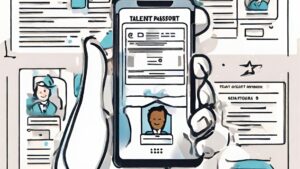Trust: Why Verifiable Credentials are essential to power Universal Talent Passports.
Universal Talent Passports (UTPs) are a concept that aims to revolutionize the way that talent is managed and recognized. By providing a standardized way to verify and track an individual’s skills and experiences, UTPs could help individuals find the right job opportunities, employers find the right candidates, and educational institutions ensure that their students are prepared for the workforce.
However, in order for UTPs to work effectively, they require a system of trust. This is where verified credentials, Comprehensive Learner Records/Learning and Employment Records (CLRs/LERs), and other tools come in.
Verified credentials are a way of ensuring that an individual’s claims about their skills and experiences are accurate. Organizations such as JFF.org and Credential Engine are working to create a common language for these credentials, so that they can be easily understood and trusted by employers, educational institutions, and other stakeholders.
CLRs/LERs are another important tool for building trust in UTPs. These records provide a comprehensive view of an individual’s learning experiences, including both formal and informal learning. Organizations such as Velocity Network and the US Chamber of Commerce t3 Innovation Network are working to create interoperable standards for CLRs/LERs, so that they can be easily shared and understood by all stakeholders.
Finally, Credential Transparency Description Language (CDTLs) are a tool that can be used to ensure that UTPs are being used in a transparent and ethical way. CDTLs provide a clear and concise summary of how an individual’s data will be used, so that they can make informed decisions about whether to share their data with a particular organization. 1EdTech is an organization that is working to create standards for CDTLs, so that they can be easily understood by all stakeholders.
All of these organizations are working to create a system of trust that will enable UTPs to be used effectively. By establishing standards for verified credentials, CLRs/LERs, and CDTLs, these organizations are helping to ensure that individuals can own and control their data, while also providing a clear and transparent way for employers, educational institutions, and other stakeholders to understand an individual’s skills and experiences.
In conclusion, UTPs have the potential to revolutionize the way that talent is managed and recognized. However, in order for UTPs to work effectively, they require a system of trust that can be built through tools such as verified credentials, CLRs/LERs, and CDTLs. Organizations such as JFF.org, Velocity Network, the US Chamber of Commerce t3 Innovation Network, Credential Engine, and 1EdTech are all working to establish these standards and create a more transparent and equitable system for all stakeholders.





